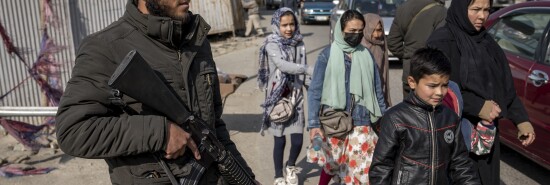
The Taliban appear to be making kill lists
Beth Bailey
Video Embed
While the world fumes about the far-reaching impacts of Taliban misogyny, Afghanistan’s leaders have quietly begun assembling apparent kill lists of their remaining enemies.
Media reports indicate that the Taliban have asked village elders and lawyers in Kabul and several northern provinces to create lists of those who worked with the former Afghan National Army or who supported foreigners prior to the Taliban’s takeover of the country. In Panjshir, where Taliban forces are actively engaged in military operations against the National Resistance Front, the Taliban are said to be searching for former government soldiers at checkpoints. In one district, Talibs have allegedly arrested several residents.
THE TALIBAN WOO CHINA AS ISIS THREAT GROWS
An Afghan who supports U.S. evacuation volunteers provided additional details about the Taliban’s kill lists. According to his network of sources in Afghanistan, Taliban intelligence personnel have been tasked with locating targeted individuals, most of whom are from the Tajik and Uzbek ethnic groups. The source states that numerous people affiliated with the former government or who worked for NATO countries have already been arrested. Sources indicated Taliban intelligence personnel have killed several of these people.
This news is another blow to Afghans who supported U.S. efforts in Afghanistan but remain in danger in their homeland while awaiting processing for special immigrant visas or referrals to the U.S. Refugee Admissions Program. Our allies already fight to survive the Taliban’s secretive reprisal campaigns, which target former military and government employees. Some have been forced to destroy the documentation that could prove their affiliation with the United States during multiple Taliban door-to-door searches that have taken place throughout the country. Most are unemployed, and many have struggled to avoid detection because their biometric profiles reside on U.S. systems the Taliban now possess. With evacuations only taking place at a trickle of 100 to 200 people per week, our allies now face a heightened level of fear as the Taliban intensify their scrutiny of the populace.
Around 22,600 Afghans have been accepted into the USRAP and await the processing of their applications. The U.S. nonprofit group No One Left Behind estimates that between 160,000 and 200,000 Afghan SIV applicants and the immediate family members who are eligible to accompany them to the U.S. remain in Afghanistan.
Jeff Phaneuf, No One Left Behind’s director of advocacy, told me the nonprofit group has been tracking Taliban reprisals “with grave concern.” The organization has collected 300 self-reported accounts of SIV applicants who were killed as a result of their service alongside U.S. forces. Though they have yet to verify every incident, at least 182 of those reviewed involved SIV applicants who were killed while waiting for processing of their cases. Of these, 91 applicants were killed after the U.S. withdrawal on Aug. 15, 2021.
The Taliban’s kill lists also signify trouble for the remainder of the populace. At 3 a.m. on Sunday, armed gunmen shot and killed former parliamentarian Mursal Nabizada and one of her security guards in her Kabul home. Whether the high-profile killing took place at the behest of the Taliban or due to the Taliban’s inability to establish security in the country is unknown. It is a damning sign of deteriorating security conditions as the Taliban prioritize their own vendettas over the interests of the population.
CLICK HERE TO READ MORE FROM THE WASHINGTON EXAMINER
Beth Bailey (@BWBailey85) is a freelance writer from the Detroit area and the co-founder of The Afghanistan Project, a forthcoming podcast delving into the tragedy wrought in the wake of the U.S. withdrawal from Afghanistan.
